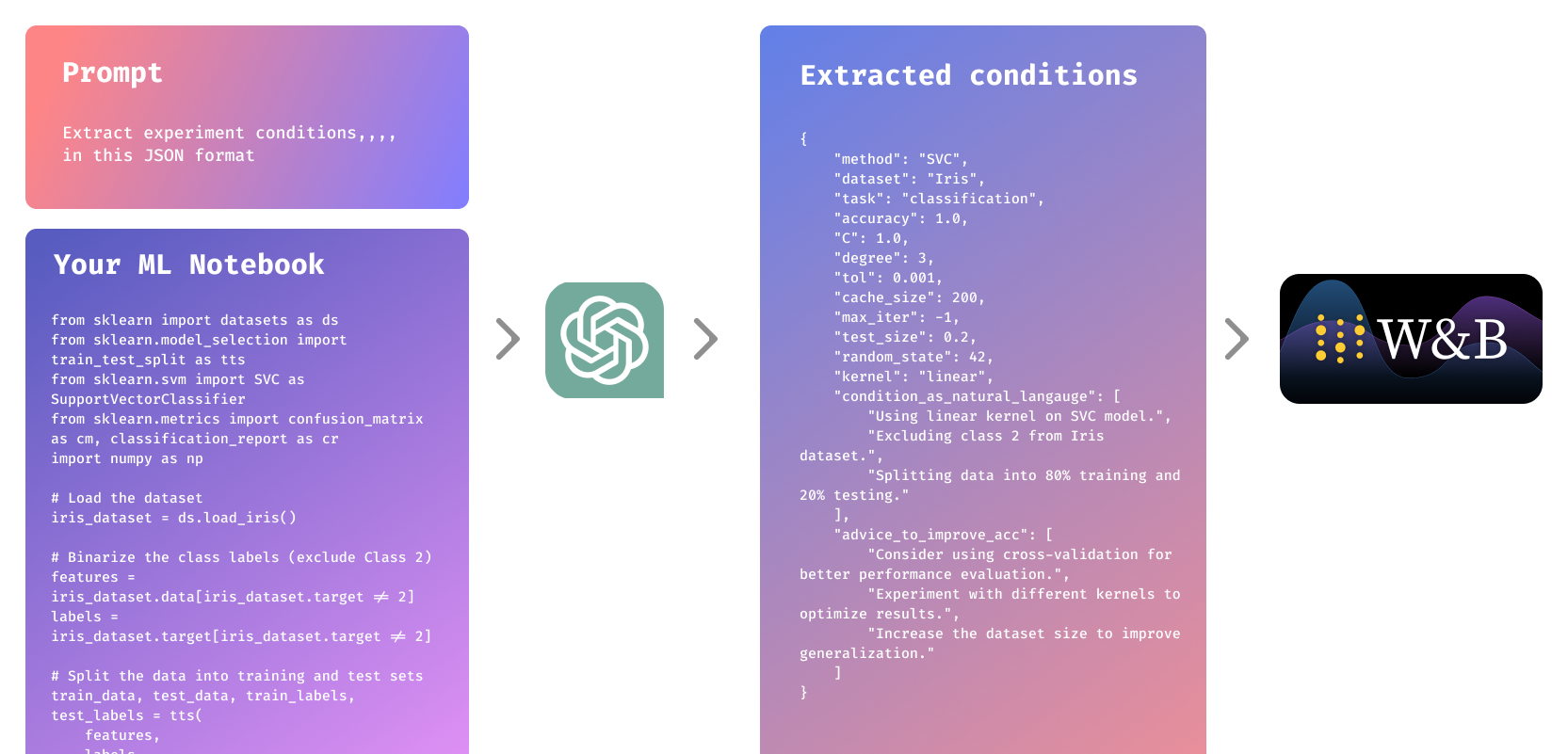🌐 Project Website | 💬 Discord Community
LLM-Enhanced ML Experiment Logging System
Ever found yourself lost in a maze of changing experiment conditions in your early ML scripts? 😵 No worries—here’s the solution you’ve been looking for! ✨
🔍 Automatic Logging: Effortlessly extracts code from Jupyter Notebook files using GPT4o, saving the logs to Weights & Biases (W&B) for seamless tracking and analysis.
💬 Natural Language Queries: Effortlessly extract and display information from WandB logs using natural language queries. Simply ask in plain language, and get insights directly. For example, you could ask, "What was the most effective method using decision trees so far?" and receive the relevant data instantly.
To install the package, run the following command in your terminal:
git clone https://github.com/shure-dev/logllm.git
pip install -e .export OPENAI_API_KEY="your-openai-api-key"
wandb loginThis command installs the package in editable mode, allowing you to modify the code and see changes without reinstalling.
Here’s a simplified example of how to use the package:
Sample Notebook Script: sample-script.ipynb
###
# Your machine learning script goes here.
# Experimental conditions are extracted from here.
###
from logllm import log_llm
notebook_path = "sample-script.ipynb" # The target file to log
log_llm(notebook_path)- developing now,,,
LLM(Our Prompt + Your ML Script) = Extracted Experimental Conditions
You are an advanced machine learning experiment designer.
Extract all experimental conditions and results for logging via W&B API.
Add your original parameters in your JSON response if you want to log other parameters.
Extract all information you can find in the given script as int, bool, or float values.
If you cannot describe conditions with int, bool, or float values, use a list of natural language.
Give advice to improve accuracy.
If you use natural language, answers should be very short.
Do not include information already provided in param_name_1 for `condition_as_natural_langauge`.
Output JSON schema example:
This is just an example, make changes as you see fit.
{{
"method": "str",
"dataset": "str",
"task": "str",
"is_advanced_method": bool,
"is_latest_method": "",
"accuracy": "",
"other_param_here": "",
"other_param_here": "",
...
"condition_as_natural_langauge": ["Small dataset."],
"advice_to_improve_acc": ["Use a bigger dataset.", "Use a simpler model."]
}}
from sklearn import datasets
from sklearn.model_selection import train_test_split
from sklearn.svm import SVC
from sklearn.metrics import accuracy_score
iris = datasets.load_iris()
X = iris.data[iris.target != 2]
y = iris.target[iris.target != 2]
X_train, X_test, y_train, y_test = train_test_split(X, y, test_size=0.2, random_state=42)
model = SVC(kernel='linear')
model.fit(X_train, y_train)
y_pred = model.predict(X_test)
accuracy = accuracy_score(y_test, y_pred)
print(f"Accuracy: {accuracy:.2f}"){
"method": "SVC",
"dataset": "Iris",
"task": "classification",
"is_advanced_method": false,
"is_latest_method": "",
"accuracy": 1.00,
"kernel": "linear",
"test_size": 0.2,
"random_state": 42,
"condition_as_natural_langauge": [
"Using linear kernel on SVC model.",
"Excluding class 2 from Iris dataset.",
"Splitting data into 80% training and 20% testing."
],
"advice_to_improve_acc": [
"Confirm dataset consistency.",
"Consider cross-validation for validation."
]
}Contributions are welcome! If you have suggestions or improvements, please feel free to submit an issue or a pull request.
This project is licensed under the MIT License.
